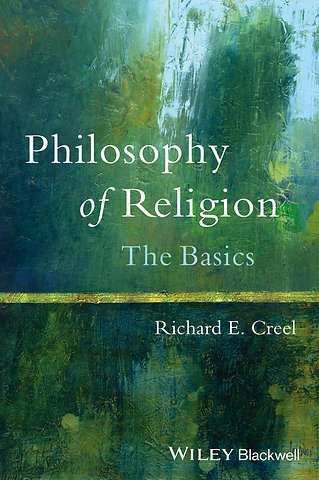Philosophy of Religion – The Basics
The Basics
Samenvatting
Philosophy of Religion: The Basics offers a concise introduction to philosophy of religion, distilling key discussions and concepts of the subject to their succinct essence, providing a truly accessible entry into the subject.
A truly accessible introduction to philosophy of religion for beginners
Takes a topical approach, starting with the nature of religion and moving the reader through the major concepts, explaining how topics connect and point to one another
Offers a thorough and full treatment of diverse conceptions of God, the ontological argument, and divine attributes and dilemmas
A genuinely concise introduction, this text can be used alongside other resources without overtaxing students
Represents 30 years of experience teaching to undergraduates
Includes a free downloadable file with key excerpts and additions to help students study
Specificaties
Inhoudsopgave
<p>Acknowledgements xii</p>
<p>Introduction 1</p>
<p>1 What Is Religion? 6</p>
<p>1.1 Creed 6</p>
<p>1.2 Code 7</p>
<p>1.3 Cult 8</p>
<p>1.4 Community 9</p>
<p>1.5 Toward a Definition of Religion 11</p>
<p>1.6 Ze, Zer, Mer 13</p>
<p>2 Six Conceptions of God 17</p>
<p>2.1 Experiential Sources of Concepts of God 17</p>
<p>2.2 Six Conceptions of God 21</p>
<p>2.3 Religious Naturalism 21</p>
<p>2.4 Pantheism 23</p>
<p>2.5 Panentheism (Process Theism) 25</p>
<p>2.6 Deism 28</p>
<p>2.7 Classical Biblical Theism is based on divine revelation 29</p>
<p>2.8 Classical Philosophical Theism 31</p>
<p>3 Divine Attributes and Dilemmas 34</p>
<p>3.1 What Is a Dilemma? 39</p>
<p>3.2 Ways to Respond to a Dilemma 40</p>
<p>3.3 Divine Attribute Dilemmas 41</p>
<p>3.4 Proposed Solutions to the Preceding Dilemmas 45</p>
<p>3.4.1 Unsurpassability 45</p>
<p>3.4.2 Omnipotence 46</p>
<p>3.4.3 Are Omnipotence and Omnibenevolence Incompatible? 47</p>
<p>3.4.4 Immutability and Personhood 48</p>
<p>3.4.5 Divine Omniscience and Human Freedom 49</p>
<p>3.5 Open Theism 53</p>
<p>4 Human Language and Talk about God 57</p>
<p>5 Arguments about the Existence of God 72</p>
<p>6 The Ontological Argument 77</p>
<p>6.1 Is Anselm s Argument Decisive? 82</p>
<p>6.2 A Version of Duns Scotus Ontological Argument 83</p>
<p>7 The Cosmological Arguments 88</p>
<p>7.1 The First Three of The Five Ways of Thomas Aquinas 89</p>
<p>7.2 Paul Edwards Infinite Regress Argument against the Cosmological Argument 92</p>
<p>7.2.1 Two Criticisms of Edwards 93</p>
<p>7.3 The Oscillatory Theory 93</p>
<p>7.3.1 Criticism of the Oscillatory Theory 94</p>
<p>7.4 The Kalam Cosmological Argument 95</p>
<p>8 The Teleological or Design Arguments 101</p>
<p>8.1 The Anthropic Principle 108</p>
<p>8.2 The Multiverse 109</p>
<p>9 God and Morality 118</p>
<p>9.1 Two Arguments from Morality for Belief in the Existence of God 118</p>
<p>9.2 The Relation of Morality to God 119</p>
<p>9.2.1 The Divine Command Theory 119</p>
<p>9.2.2 Theocentric Ethics 120</p>
<p>9.2.3 Natural Law Ethics 121</p>
<p>10 Religious Experience and Belief in God 128</p>
<p>10.1 The Principle of Credulity and the Rationality of Belief in God 128</p>
<p>10.2 Religious Experience as Evidence for the Existence of God 132</p>
<p>10.3 Toward a Cumulative Argument for God 134</p>
<p>11 Arguments against Belief in the Existence of God 137</p>
<p>11.1 Evidentialism and the Burden of Proof 137</p>
<p>11.2 Conceptual Arguments: Analysis of the Concept of God 138</p>
<p>11.2.1 The Argument from Meaninglessness 138</p>
<p>11.2.2 The Arguments from Incoherence and Self–Contradiction 138</p>
<p>11.3 Arguments from Science 139</p>
<p>11.3.1 The Natural Sciences: The Adequacy of Science 139</p>
<p>11.3.2 Criticisms of Naturalism 141</p>
<p>11.3.3 The Social Sciences: Religion and Emotion 142</p>
<p>11.4 The Problem of Divine Hiddenness 145</p>
<p>11.5 The Problem of Many Religions 147</p>
<p>12 The Problem of Evil 152</p>
<p>12.1 G.W. Leibniz (1646 1716) 153</p>
<p>12.2 The Logical Argument from Evil: Arthur Schopenhauer (1788 1860) 153</p>
<p>12.3 The Evidential Argument from Evil: Edward Madden, Peter Hare, William Rowe 153</p>
<p>12.3.1 Criticisms of Arguments from Evil against the Existence of God 154</p>
<p>12.4 Charles Hartshorne s Panentheist or Process Theodicy 156</p>
<p>13 God and Life after Death 164</p>
<p>13.1 Cessationism 165</p>
<p>13.2 Immortalism 167</p>
<p>13.3 Resurrectionism 170</p>
<p>13.4 Personal Identity and Continuity 173</p>
<p>14 Miracles, Revelation, and Prayer 179</p>
<p>14.1 Miracles 179</p>
<p>14.2 Revelation 182</p>
<p>14.3 Prayer 183</p>
<p>15 Rationality without Evidence 185</p>
<p>15.1 Pascal s Wager 185</p>
<p>15.2 Evidentialism vs. the Right to Believe 187</p>
<p>15.3 Fideism 188</p>
<p>15.3.1 Faith as Action or Leap 188</p>
<p>15.3.2 Faith as Passion or Gift 189</p>
<p>15.4 Agathism, Agatheism, and Religious Hope 190</p>
<p>Glossary 194</p>
<p>Biographical Notes 203</p>
<p>Index 209</p>

